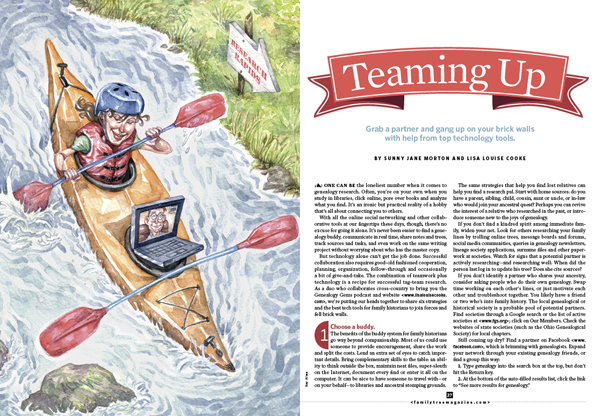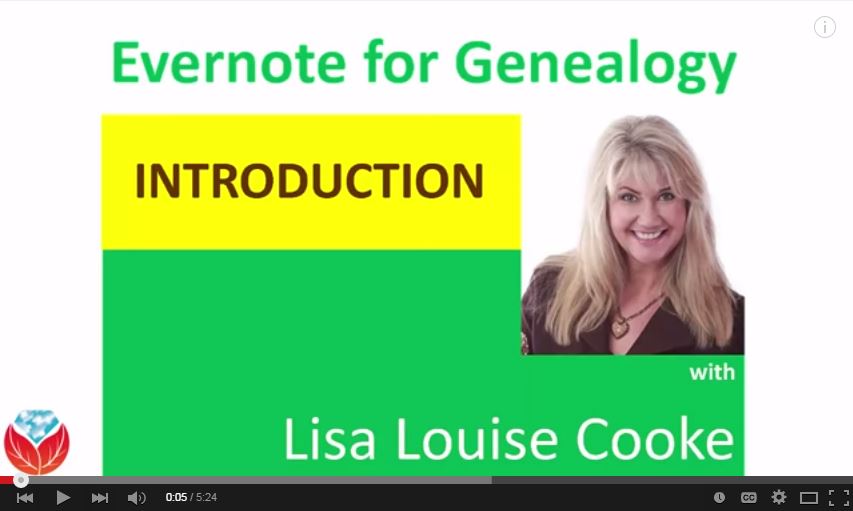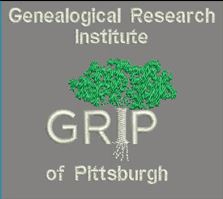by Lisa Cooke | Nov 11, 2013 | 01 What's New, Collaborate, Dropbox, Family Tree Magazine, Inspiration, Research Skills, Technology
Recently Katharine, a Premium podcast member, asked for my advice on collaborating with a research partner. She wrote, “While I am primarily a digital  researcher, and have divested myself of duplicate papers, my research buddy uses a lot of binders and has many unconnected families in various computer genealogy programs. We need a good way to collect and focus our research.”
researcher, and have divested myself of duplicate papers, my research buddy uses a lot of binders and has many unconnected families in various computer genealogy programs. We need a good way to collect and focus our research.”
As it happens, Genealogy Gems Contributing Editor Sunny Morton and I just co-wrote an article on this topic. “Teaming Up” appears in the December 2013 issue of Family Tree Magazine. In honor of this article, we’ve prepared a companion series of blog posts on collaborating and are hosting a FREE giveaway for a digital subscription to Family Tree Magazine.
First, check out these strategies for deciding how to work with someone.
First, don’t judge or try to change each other too much. If one of you really wants to learn new tech tools or organizational methods, that’s great. But your strategy for staying organized and connected should be as easy as possible for both of you so you can focus on the research itself. Requiring an old-school genealogist to suddenly master Skype, Evernote and Dropbox to work together might be as unfair as asking a newbie researcher to locate unindexed court records and transcribe them in German!
Next, play to your strengths. Is one of you super organized, or a fast typist, or great at merging GEDCOMS or another skill that would move your project forward? Does only one of you have direct access to certain research materials (databases, manuscript sources, etc)? Talk about your individual strengths and interests and then divide the workload accordingly.
Mix it up. Often in any collaboration, one person is more tech-savvy than the other. Sometimes a combination of traditional and up-to-the-minute technologies will work best. For example, maybe you’ll decide to keep your shared files in Dropbox but communicate by old-fashioned telephone instead of Skype. Maybe one of you will organize everything online (or at least on the computer) and then mail printouts to a non-computer-user for review.
 Watch this blog for more on technology tools for collaborating, and check out our article (which has lots of great exclusive stuff!) in the December 2013 issue of Family Tree Magazine
Watch this blog for more on technology tools for collaborating, and check out our article (which has lots of great exclusive stuff!) in the December 2013 issue of Family Tree Magazine  , available by digital and print subscription.
, available by digital and print subscription.
Check out the other posts in this series:
Tips for Collaborative Genealogy: Dropbox for Genealogists
Tips for Collaborative Genealogy: Evernote for Genealogists
Tips for Collaborative Genealogy: Sharing Genealogy Files Online for Free
by Lisa Cooke | Apr 7, 2015 | 01 What's New, Evernote, Organization, Source Citation, Video, YouTube
Using Evernote for genealogy yet? I hear from people all over the world who are harnessing this free software to finally organize their family history  research FOR GOOD!
research FOR GOOD!
Evernote users can easily import online research finds–along with the URL and other important source information. Many people are bringing their family history papers (original documents and paper-based research) into Evernote, too. All their research materials together, keyword and OCR-searchable, in one space, accessible from and fully-synched across all your devices. Sigh! It’s wonderful!
There’s so much demand in the genealogy community for learning to use Evernote for genealogy that I’ve started a YouTube series: Evernote for Genealogy. Two videos are posted so far:
These videos are absolutely free to watch, and they’ll get anyone started using Evernote for genealogy. And of course all the Evernote applications are free too! Who do you know who would benefit from getting organized? I hope you’ll share these videos with your friends and relatives! How about the students in your life? Or your co-workers? We may be using genealogy, but note-taking and organization are important to everyone.
 Ready to take your Evernote learning a little further? Become a Genealogy Gems Premium member. Members have a full-year’s access to the ultimate Evernote education: my in-depth video series! Full-length classes for Premium members include:
Ready to take your Evernote learning a little further? Become a Genealogy Gems Premium member. Members have a full-year’s access to the ultimate Evernote education: my in-depth video series! Full-length classes for Premium members include:
Premium members also get access to my “Get Started with Evernote” mini video series:
Episode 1 – Signing Up for Your Free Evernote Account & Downloading the Desktop App
Episode 2 – Getting the Web Clipper
Episode 3 – How to Clip Using Evernote’s Desktop Clipper
Episode 4 – How to Clip Content Using Evernote’s Browser Web Clipper
Episode 5 – How to Use Evernote’s Web Clipper for Chrome
Click here to find even more resources for using Evernote for genealogy! And thanks for sharing this post with others who would benefit from using Evernote to organize their genealogy research.
by Lisa Cooke | Apr 13, 2019 | 01 What's New, Cloud Backup, Disaster Prevention, images, Organization
Every genealogist eventually finds themselves with more paper than they know what to do with. Records, photos, letters, and other ephemera inevitably begin to pile up in the pursuit of our ancestors. So how do you preserve it and protect it for future generations? One...
by Lacey Cooke | Apr 19, 2019 | 01 What's New, Records & databases
It’s a great week for new genealogy records online! We’re featuring German vital records now available at Ancestry.com, including civil registers, parish records, and census records. You can also explore two updated Italian records collections at...
by Lisa Cooke | Jul 29, 2013 | 01 What's New, Conferences, DNA, Inspiration, NARA
 Hello from Genealogy Gems Contributing Editor Sunny McClellan Morton. I’m still flying high after a week just spent at GRIP, the Genealogical Research Institute of Pittsburgh. This was like mini-graduate school for genealogists, complete with a lush green campus in the rolling hills of Pennsylvania; immediate access to legendary instructors; rigorous coursework that’s exactly what I want to learn; a great genealogy bookstore; and plenty of after-hours socializing.
Hello from Genealogy Gems Contributing Editor Sunny McClellan Morton. I’m still flying high after a week just spent at GRIP, the Genealogical Research Institute of Pittsburgh. This was like mini-graduate school for genealogists, complete with a lush green campus in the rolling hills of Pennsylvania; immediate access to legendary instructors; rigorous coursework that’s exactly what I want to learn; a great genealogy bookstore; and plenty of after-hours socializing.
While I was there, GRIP announced an exciting lineup for 2014 (it’s not even on their website yet). Here are the topics and instructors:
- Finding and Documenting African-American Families with J. Mark Lowe, CG, and Deborah Abbott, PhD.
- Practical Genetic Genealogy with Debbie Parker Wayne, CG, CGL, CeCe Moore and Blaine Bettinger, PhD, JD.
- Law School for Genealogists with Judy G. Russell, JD, CG, CGL and Richard G. “Rick” Sayre, CG, CGL.
- Becoming an Online Expert: Mastering Search Engines and Digital Archives with D. Joshua Taylor, MA, MLS.
- Determining Kinship Reliably with the Genealogical Proof Standard with Thomas W. Jones, PhD.
- Intermediate Genealogy: Tools for Digging Deeper with Paula Stuart-Warren, CG, FMGS, FUGA.
All those initials after these instructors’ names means tons of expertise is poured into every GRIP experience, and if you know any of these folks you know there’s not a “boring professor” among them!
If you’re ready for seriously advanced genealogy education, check out GRIP or other learning experiences like it. In the United States, I know about SLIG in Salt Lake City, IGHR at Samford University in Birmingham, and NIGR at the National Archives. There are also more flexible (but still demanding) options like ProGen Study Groups, Boston University’s Genealogical Research Programs and the National Genealogical Society’s American Genealogy Home Study course.
Don’t forget to check out programs and conferences offered by your own state, regional and local genealogical societies. They usually offer a variety of topics for beginners to more advanced students–and they’ll be closer to home and less expensive. Our own Genealogy Gems premium memberships offers a fabulous genealogy education for a fabulous price: in addition to premium podcast episodes, you also get a new, full-length video tutorial every MONTH to watch whenever you like, along with unlimited access to all previous full-length video tutorials. Check out our list of Premium Videos here.
 researcher, and have divested myself of duplicate papers, my research buddy uses a lot of binders and has many unconnected families in various computer genealogy programs. We need a good way to collect and focus our research.”
researcher, and have divested myself of duplicate papers, my research buddy uses a lot of binders and has many unconnected families in various computer genealogy programs. We need a good way to collect and focus our research.” Watch this blog for more on technology tools for collaborating, and check out our article (which has lots of great exclusive stuff!) in the December 2013 issue of Family Tree Magazine
Watch this blog for more on technology tools for collaborating, and check out our article (which has lots of great exclusive stuff!) in the December 2013 issue of Family Tree Magazine , available by digital and print subscription.

 research FOR GOOD!
research FOR GOOD!
